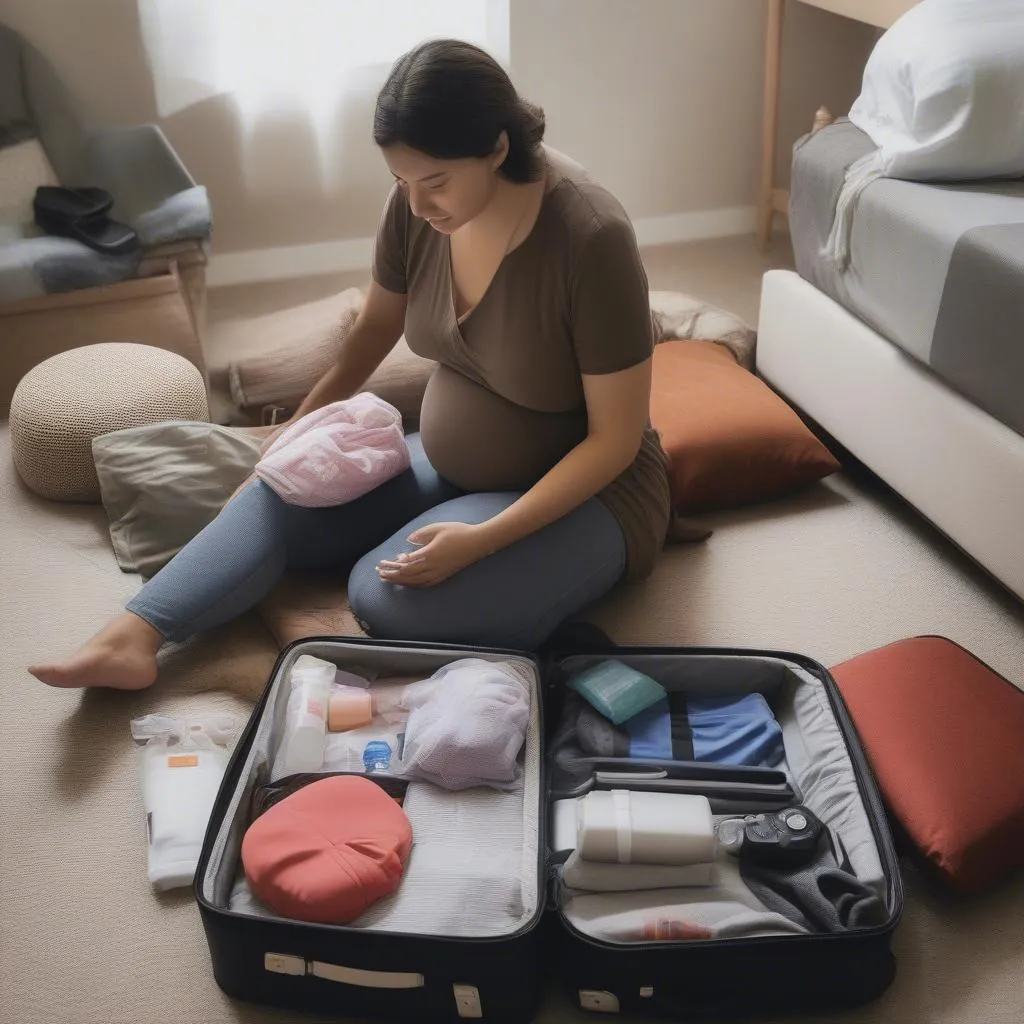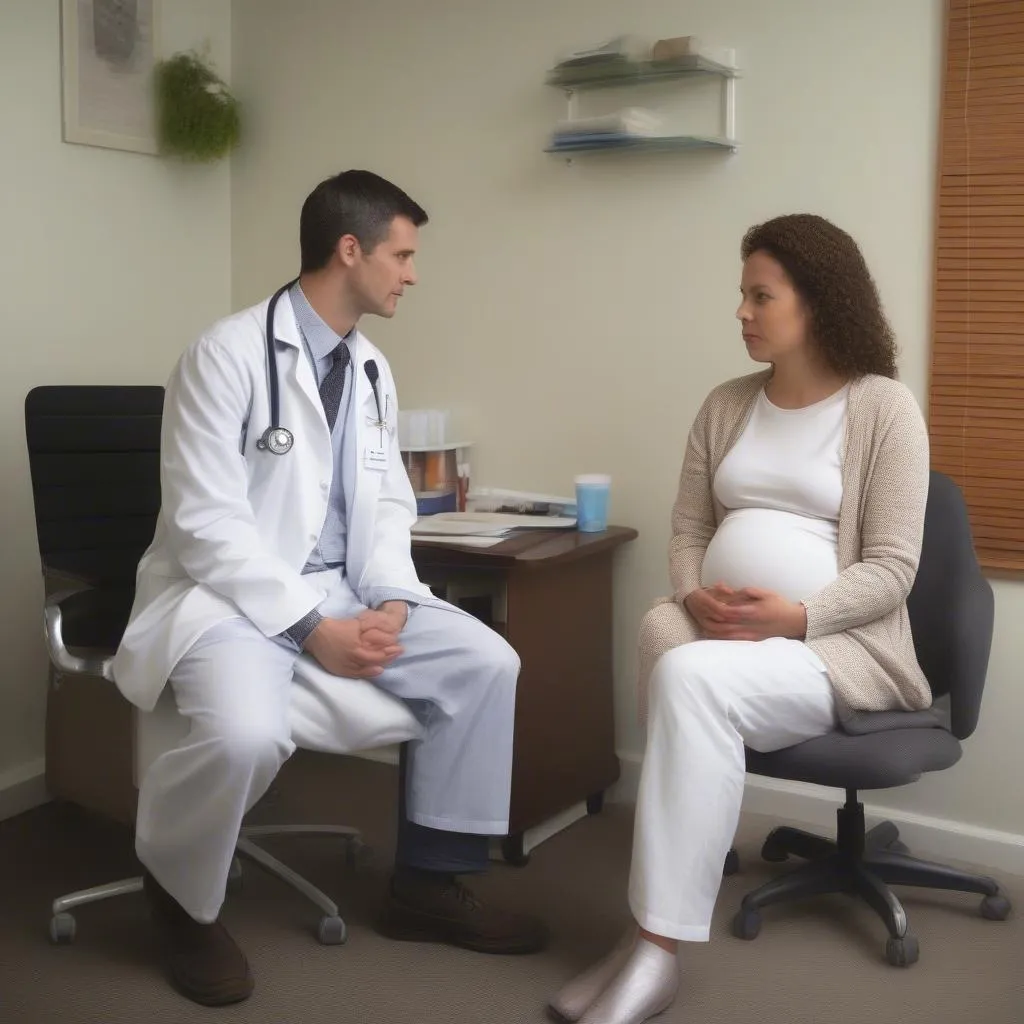“Is it safe to travel during pregnancy?” my best friend Sarah asked me, her eyes wide with a mixture of excitement and worry. She’d been planning a babymoon to Santorini, Greece, picturing breathtaking sunsets over the Aegean Sea with her partner. However, with a bun in the oven, she was understandably cautious. Her question is a common one, and the answer, like most things related to pregnancy, isn’t always simple.
Factors to Consider When Deciding When to Stop Traveling While Pregnant
Just like choosing the perfect travel destination, deciding when to stop traveling during pregnancy is a personal decision. There’s no one-size-fits-all answer. Several factors come into play, and understanding them can help you make an informed choice:
Your Pregnancy Stage
Generally, the second trimester (weeks 14-28) is considered the safest and most comfortable time to travel. You’re past the morning sickness of the first trimester, and your energy levels are usually higher.
First Trimester (Weeks 1-13): While traveling in the first trimester is usually safe, morning sickness and fatigue can be challenging.
Second Trimester (Weeks 14-28): This is often considered the “sweet spot” for travel. However, discussing your travel plans with your healthcare provider is still crucial.
Third Trimester (Weeks 29-40): Airlines and cruise lines often have restrictions on flying or sailing during the third trimester, usually after a certain gestational age. This is due to the increased risk of premature labor.
 Pregnant woman walking on a beach
Pregnant woman walking on a beach
Your Health and Your Baby’s Health
If you have a healthy pregnancy with no complications, you’re more likely to have a safe and enjoyable travel experience. However, if you have any pre-existing health conditions or pregnancy complications, consult your doctor to assess the risks and benefits of traveling.
Your Destination
Traveling to a remote island with limited medical facilities might not be the best idea during pregnancy. Consider the availability of healthcare services, the quality of sanitation, and the prevalence of diseases at your destination.
Mode of Transportation
Long flights or car rides can increase the risk of blood clots, especially during pregnancy. If you’re flying, ensure you move around the cabin and stay hydrated. Compression socks can also be helpful.
When Is It Recommended to Stop Traveling During Pregnancy?
While every pregnancy is unique, most healthcare providers advise against traveling after 36 weeks of pregnancy. This is because labor can start unexpectedly, and being far from home and your healthcare provider can add unnecessary stress and complications.
 Pregnant woman consulting doctor in clinic
Pregnant woman consulting doctor in clinic
Tips for Planning Safe and Comfortable Travels During Pregnancy
Consult Your Healthcare Provider
Before booking your trip, schedule a check-up with your doctor or midwife. They can assess your overall health, discuss any potential risks, and provide personalized recommendations.
Choose Your Destination Wisely
Opt for destinations with easy access to healthcare facilities and good sanitation standards. Consider the climate and altitude, as extreme conditions can be taxing during pregnancy.
Pack Smart
Pack comfortable clothing, compression socks, any necessary medications (with prescriptions), and snacks to keep your energy levels up. A travel pillow can also be a lifesaver on long journeys.
 Pregnant woman packing suitcase for trip
Pregnant woman packing suitcase for trip
Frequently Asked Questions
Q: Can I travel by plane during my first trimester?
A: While generally safe, discuss your travel plans with your doctor, especially if you experience severe morning sickness or have any concerns.
Q: Are there any specific destinations pregnant women should avoid?
A: It’s best to avoid areas with high rates of Zika virus or other mosquito-borne illnesses. Your doctor can provide guidance on travel advisories.
Q: What about travel insurance?
A: Travel insurance is always a good idea, but it’s especially important during pregnancy. Ensure your policy covers pregnancy-related complications.
The Joy of Experiencing New Cultures While Expecting
Remember Sarah and her Santorini dream? After carefully considering her options and consulting her doctor, she decided to postpone her trip until after the baby arrived. It wasn’t an easy choice, but it was the right one for her and her baby’s well-being.
While pregnancy might come with certain travel limitations, it’s a beautiful time to connect with your partner, explore closer-to-home destinations, or simply embrace the joy of anticipation. Always prioritize your health and safety, and remember that the adventure of parenthood is just around the corner.
For more tips on navigating pregnancy and travel, explore the wealth of resources available on TRAVELCAR.edu.vn. And don’t forget to share your own experiences and insights in the comments below – your stories might inspire other expectant mothers planning their adventures!


